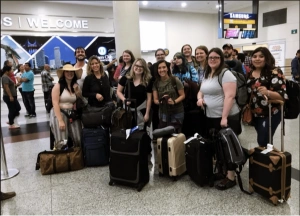Conquer your studying abroad packing with this ultimate guide. Studying abroad is an incredible opportunity to expand your horizons, gain new perspectives, and immerse yourself in different cultures while pursuing your academic goals.

Essentials For International Students
- Documents: passport (with a valid visa), official academic documents, travel insurance, health insurance documentation, immunization records, and driver’s license (if needed).
- Electronics: smartphone with charger, laptop with charger, travel adapter, portable charger, headphones, camera with charger, memory cards.
- Clothes: Pack versatile and comfortable clothing for various weather conditions and cultural norms. Include essentials like underwear, jeans, t-shirts, sweaters, comfortable shoes, rain gear, and a warm coat. Consider packing for both formal and casual occasions.
- Toiletries: Pack basics like travel-sized toiletries, sunscreen, hand sanitizer, insect repellent, feminine hygiene products, medications you regularly use, and any prescription medications with a doctor’s note.
- First-aid Kit: Pack basic medicine for common ailments like headaches, upset stomachs, and allergies.
Related: Global Citizenship Education: Fostering Inclusivity And Tolerance
Additional items:
- Luggage: Pack lightly. Check airline baggage restrictions and bring a backpack on day trips. A little baggage item for carry-on essentials is useful.
- Sleeping bag and pillowcase for hostels or guest houses.
- Locks and padlocks: Keep your possessions safe.
- Universal adapters are used to charge electronics all across the world.
- Water Bottle: Stay hydrated while reducing plastic waste.
- If you want to do your laundry, you’ll need laundry detergent and a drying rack.
- Notebook and pen: to take notes and diary.
- Cultural adaptation options include a phrasebook, a guidebook, and a language-learning app.
- Entertainment includes books, music, and games.
- Sewing kit and safety pins: for rapid repairs.
- Make photocopies of key documents as backups.
Related: Online International Education: Exploring Virtual Learning

Pro Tip:
- Roll your clothing. It saves space and avoids creases.
- Leave some room in your suitcase. You might want to bring some souvenirs back.
- Discover what you can buy at your destination. Some items, such as bulky toiletries, can be purchased after you arrive.
- Label your luggage clearly.
- Check the weather forecast for your destination.
- Pack for comfort and adaptability.
- Most importantly, do not stress. Packing can be enjoyable, and you can always buy what you forgot once you arrive.
This is a generic list, and you may need to modify it depending on your location, program duration, and personal preferences.
Related: Student Housing Options: Finding Your Home Abroad
Bonus:
- Gifts for locals and friends: Small items representing your home culture can be a thoughtful gesture.
- Photo album or journal: To capture your memories and document your journey.
- Positive attitude and open mind: embrace new experiences and cultural differences.
Related: Study Abroad Reflection: International Students’ Experiences

When To Start Packing For Study Abroad
The ideal time to start packing for your study abroad adventure depends on a few factors, including:
Program duration:
- Short-term programs (1-2 weeks): Start packing 2-3 weeks before departure.
- Semester-long programs: Begin packing 4-6 weeks before departure.
- Full academic year: Start packing 6–8 weeks before departure.
Related: Staying Connected Using Technology
Destination and logistics:
- Visas and other documentation: Some visa applications require specific documents, so starting early ensures you have everything ready in time.
- Weather and climate: Research the weather patterns at your destination and pack accordingly. Early packing gives you time to purchase any specialized clothing you might need.
- Travel arrangements: If you’re checking luggage, consider airline baggage restrictions and any deadlines for booking extra baggage.
Related: Language Immersion: Mastering a New Tongue
Personal preferences:
- Packers and procrastinators: If you like being organized and avoiding last-minute stress, start earlier. For those who prefer a more spontaneous approach, later packing might be okay.
- Shopping opportunities: If you plan to buy some items at your destination, you can pack lighter and start later.
Related: Study Abroad Visa Interview: Navigating The Application Process

Here’s a general chronology to help you:
Eight to twelve weeks before:
- Research your destination and program requirements.
- Make a packing list based on your needs and the weather.
- Gather the paperwork needed for visas and applications.
- Book flights and travel insurance.
- Begin exploring potential lodging choices.
Related: Study Abroad Scholarships: Funding Your Global Educational Adventure
4–6 weeks before:
- Buy any necessary gear or equipment.
- Start packing essentials such as paperwork, gadgets, and toiletries.
- Investigate local customs and cultural norms.
- Learn simple phrases in the local language (if feasible).
Related: Choosing The Perfect Destination: Where To Study Abroad
2-3 weeks before:
- Finalize your packing list and check it twice.
- Label your luggage clearly.
- Research currency exchange and banking options.
- Pack your carry-on bag with essentials for the flight.
Related: Gap Year Adventures: Maximizing Learning Opportunities Abroad
1 week before:
- Double-check visa validity and ensure all documents are in order.
- Confirm accommodation arrangements and travel bookings.
- Download offline maps and language apps (if relevant).
- Say goodbye to loved ones and prepare for your adventure.
The most important thing is to be flexible and adjust your timeline based on your circumstances. Don’t stress if you haven’t started packing exactly on schedule. The key is to be organized, make progress over time, and ensure you have everything you need to make your study abroad experience amazing.
Related: Cultural Exchange: Embracing Diversity In Your Study Abroad

How To Pack For An International Flight As A Student
As a student, packing for an international flight may be both exhilarating and terrifying! Here are some suggestions to help you pack wisely and prevent stressful last-minute decisions:
Before you pack:
- Check baggage allowances, carry-on restrictions, and forbidden items for your desired airline and destination.
- Create a packing list. To avoid packing too much, plan your outfits for many eventualities. Consider the weather, cultural customs, and any scheduled events.
- Choose the right luggage: Opt for a sturdy suitcase or backpack that meets airline size and weight limitations. Consider a smaller carry-on bag for essentials like medication, documents, and entertainment.
Related: Internship Abroad: Gaining Practical Experience While Studying

Best Time To Study Abroad
There’s no single “best” time to study abroad, as it truly depends on your circumstances and academic goals. However, I can provide some insights to help you determine the optimal timing for your unique situation:
Academic considerations:
- Course availability: Some programs or courses might only be offered during specific semesters or years. Check with your academic advisor or desired program to confirm availability.
- Academic workload: Consider your existing academic schedule and whether studying abroad would coincide with challenging coursework or exams. You might choose a lighter semester or summer program for a less demanding experience.
- Graduation timeline: Plan your study abroad experience to ensure it aligns with your graduation requirements and doesn’t delay your degree completion.
Related: Scholarships For High School Seniors: Planning For Higher Education
Personal factors:
- Financial aid and budgeting: Research scholarships and financial aid options available for study abroad programs. Consider factoring in program costs, living expenses, and travel fees when choosing a timeframe.
- Internships and career goals: If you want to incorporate internships or volunteer work into your study abroad experience, research opportunities are available during different semesters or seasons.
- Personal commitments and travel preferences: Think about existing commitments like jobs, family events, or other personal obligations when choosing a timeframe. Consider your preferred travel seasons and weather conditions at your chosen destination.
Related: Reverse Culture Shock After Study Abroad

Popular timeframes for studying abroad:
- Summer: A flexible option often popular with undergraduates, offering shorter programs and less disruption to academic schedules.
- Semester abroad: This allows for deeper immersion in the host culture and academic program but might affect your coursework at your home university.
- Gap year: Taking a gap year before or after studies provides more flexibility for longer programs and travel exploration.
Ultimately, the best time to study abroad is the one that best suits your individual needs, academic goals, and personal circumstances.
Related: Healthcare Scholarships: Pursuing Medical And Nursing Fields
Here are some more tips for making your decision:
- Speak to advisors and alumni: Consult academic advisors, program coordinators, and students who have already studied abroad. They can provide helpful insights and help you consider your options.
- Research your preferred program and destination. understand the program structure, course options, and cultural features of your preferred destination. Consider whether a specific timeframe works well for their academic calendar or cultural events.
- Be flexible and open-minded. While planning is crucial, unexpected possibilities can arise. Be willing to adjust your schedule if an amazing program or experience arises.
Regardless of the timing, studying abroad provides an excellent opportunity for personal and academic development. Select a timeframe that enables you to maximize your experience and build lasting memories.
Related: Winning Scholarships For Community College Students

How Often You Should Travel When Studying Abroad
There’s no one-size-fits-all answer to how often you should travel when studying abroad, as it depends on several factors:
Program duration and structure:
- Short-term programs: With limited time, prioritize exploring your host city and nearby areas. Longer trips might require careful budgeting and planning for more extensive travel.
- Academic focus: programs with demanding coursework might limit travel opportunities, while those with flexibility or internship components might encourage exploration.
Related: Education Loans Or Scholarships: Weighing Your Options
Personal preferences and budget:
- Travel enthusiast: If you’re passionate about exploring new places, you might seek frequent weekend trips or shorter travel breaks.
- Budget-conscious: Consider transportation costs, accommodation, and potential visa restrictions when planning your travels.
- Balance and focus: prioritize academic obligations and cultural immersion without neglecting the opportunity to discover other destinations.
Related: Financial Aid For First-Generation College Students

Destination and Travel Options:
- Accessibility and distance: Frequent travel is made easier if your host city is well-connected and surrounded by intriguing places. Long distances or problematic transportation may require fewer but longer trips.
- Cultural experiences: Immerse yourself in local culture and traditions while also venturing out to extend your horizons.
Related: Common Scholarship Application Mistakes To Avoid In 2024
Here are some tips to help you plan your travel frequency:
- Set a budget: Determine how much you can realistically allocate for travel without compromising your academic focus or finances.
- Research travel options: Explore affordable transportation options like trains, buses, or budget airlines to make the most of your budget.
- Prioritize nearby destinations: Start by exploring nearby cities, towns, or natural landmarks before venturing further.
- Consider weekend trips: short getaways offer a refreshing break without disrupting your academic routine.
- Plan longer trips during breaks: Utilize extended holidays or university breaks for more in-depth travel experiences.
- Connect with fellow travelers: Sharing travel costs and adventures with other students can be a fun and budget-friendly option.
- Remember your focus: balance travel with your academic commitments and cultural immersion in your host country.
Ultimately, the ideal travel frequency is a personal choice. Find a balance that allows you to experience the benefits of both academic immersion and exploration, making the most of your precious study abroad journey.
Related: Student Insurance: A Wise Investment For College Life

What You Shouldn’t Bring To Study Abroad
While packing with excitement for your study abroad adventure is exhilarating, it’s crucial to consider what to leave behind. Here are some items you might want to reconsider bringing:
Unnecessary bulk items:
- Hairdryer: Most hostels and apartments offer hairdryers, and adapters can be purchased if needed.
- Iron: Wrinkles will likely smooth out naturally due to humid environments or frequent washing. Travel steamers are a compact alternative.
- Heavy shoes: Pack versatile and comfortable shoes suitable for walking and exploring, but leave bulky hiking boots or formal shoes unless essential for specific occasions.
- Excess toiletries: Pack travel-sized essentials and plan to buy larger items once you arrive, reducing luggage weight and saving space.
- Expensive electronics: Laptops and cameras are valuable, but consider cheaper substitutes for everyday use if theft is a concern.
Related: Navigating Admission Tests For International Students
Items You Can Easily Find Locally:
- Towels and bedsheets: Hostels and apartments often provide these, or they can be purchased cheaply at your destination.
- Kitchen appliances: Unless you plan on extensive cooking, most basic utensils and cookware can be found locally.
- Clothes for every occasion: Pack versatile pieces you can mix and match, reducing the need for specific outfits for every event.
- Extensive food items: Focus on portable snacks and spices, leaving heavier food items behind as you can typically find most things at your destination.
- Books and textbooks: E-readers and online resources can save space and weight, and specific textbooks might be available at your host university’s library.
Related: Medical School Admission For Aspiring Doctors
Items that raise cultural or practical concerns:
- Effective hair styling tools: Voltage fluctuations may damage certain gadgets, and adapters may be insufficient.
- Certain drugs: Check the prescription regulations and availability at your destination to prevent bringing needless or illegal prescriptions.
- Strong perfumes or fragrances: Cultural sensitivities and personal preferences for odors may attract unwelcome attention.
- Items considered insulting to local customs: Look into suitable dress and avoid culturally offensive items or outfits.
- Documents in a single location: Make copies of important documents and keep them separate in case of loss or theft.
Related: Admission Process For Study Abroad Programs
General Packing Tips:
- Roll your clothes to conserve space and prevent wrinkles.
- Leave some space in your luggage for mementos.
- Check the airline’s luggage limitations. Understanding weight and size limitations can help you avoid unexpected penalties.
- Label your luggage carefully to minimize confusion at the airport.
- Pack for comfort and adaptability.
- Most importantly, enjoy the journey and prevent worry. You can always get anything you forget when you arrive.
Packing light and strategically gives you better flexibility and adaptability during your study abroad adventure. Concentrate on the necessary, welcome new experiences, and make room for spontaneous adventures.
Related: Educational Institution Liability Insurance

Best Suitcase For Studying Abroad Packing
Finding the perfect luggage for studying abroad depends on several factors:
Program duration:
- For short journeys, choose a smaller, carry-on suitcase or backpack to maximize agility. Check the airline’s size and weight requirements to avoid baggage fees.
- For longer programs, consider a larger checked suitcase measuring 24-28 inches. Choose a long-lasting alternative with expanding sections for added capacity.
Related: Admission Requirements For Online Degree Programs
Travel Style:
- Backpacker: If you intend to go on frequent weekend trips or backpacking experiences, a robust backpack with appropriate support and comfort is essential.
- Frequent traveler: Choose a lightweight, agile bag with spinner wheels for easy movement through airports and rail stations.
- To maximize efficiency, use luggage with compression straps or packing cubes that take up little room.
Related: International Student Insurance Options For Studying In The U.S
Budget:
- Affordable: Many durable and reliable suitcases are available at moderate prices. Consider brands like Samsonite, American Tourister, or Ricardo Beverly Hills.
- Premium: Invest in a high-quality, lightweight suitcase from brands like Briggs & Riley, Away, or Rimowa for ultimate durability and features.
Related: Resources For Students With Disabilities: Special Education Admission

Additional Features:
- Hard-shell vs. soft-shell: Hard-shell offers better protection for fragile items, while soft-shell provides more flexibility and expands for extra packing.
- TSA lock: convenient for airport security checks.
- Warranty: Choose a suitcase with a good warranty for peace of mind.
- Sustainability: Consider eco-friendly materials and recycled content for a responsible choice.
Related: 5 Insurance Tips For Parents Of College Students
Here are some popular options for different priorities:
- Best overall: Osprey Farpoint/Fairview Wheeled Travel Pack (backpack) or Samsonite Omni PC Hardside Spinner (hard-shell suitcase).
- Most affordable: American Tourister Hardside Spinner or AmazonBasics Hardside Spinner.
- Lightweight: Briggs & Riley Baseline Domestic Carry-On Expandable Upright or Away Bigger Carry-On.
- Backpacking: Osprey Atmos/Aura AG or Kelty Redwing 44/50.
The best suitcase is the one that suits your individual needs, travel style, and budget. Research, compare options, and choose a reliable companion for your exciting study abroad adventure.
Related: Educational Travel Insurance For Students
Conclusion
Packing for your study abroad journey might seem daunting, but with the right essentials and thoughtful planning, you can approach it with excitement and confidence. Remember, you’re not just packing luggage; you’re packing experiences, memories, and personal growth.

